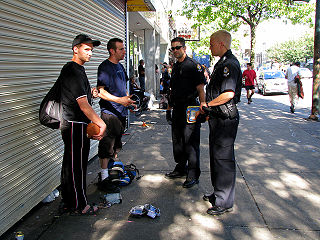Related Research Articles

Theft is the act of taking another person's property or services without that person's permission or consent with the intent to deprive the rightful owner of it. The word theft is also used as a synonym or informal shorthand term for some crimes against property, such as larceny, robbery, embezzlement, extortion, blackmail, or receiving stolen property. In some jurisdictions, theft is considered to be synonymous with larceny, while in others, theft is defined more narrowly. Someone who carries out an act of theft may be described as a "thief".
Robbery is the crime of taking or attempting to take anything of value by force, threat of force, or by use of fear. According to common law, robbery is defined as taking the property of another, with the intent to permanently deprive the person of that property, by means of force or fear; that is, it is a larceny or theft accomplished by an assault. Precise definitions of the offence may vary between jurisdictions. Robbery is differentiated from other forms of theft by its inherently violent nature ; whereas many lesser forms of theft are punished as misdemeanors, robbery is always a felony in jurisdictions that distinguish between the two. Under English law, most forms of theft are triable either way, whereas robbery is triable only on indictment. The word "rob" came via French from Late Latin words of Germanic origin, from Common Germanic raub "theft".

In law, fraud is intentional deception to secure unfair or unlawful gain, or to deprive a victim of a legal right. Fraud can violate civil law or criminal law, or it may cause no loss of money, property, or legal right but still be an element of another civil or criminal wrong. The purpose of fraud may be monetary gain or other benefits, for example by obtaining a passport, travel document, or driver's license, or mortgage fraud, where the perpetrator may attempt to qualify for a mortgage by way of false statements.

Forgery is a white-collar crime that generally refers to the false making or material alteration of a legal instrument with the specific intent to defraud anyone. Tampering with a certain legal instrument may be forbidden by law in some jurisdictions but such an offense is not related to forgery unless the tampered legal instrument was actually used in the course of the crime to defraud another person or entity. Copies, studio replicas, and reproductions are not considered forgeries, though they may later become forgeries through knowing and willful misrepresentations.
Larceny is a crime involving the unlawful taking or theft of the personal property of another person or business. It was an offence under the common law of England and became an offence in jurisdictions which incorporated the common law of England into their own law, where in many cases it remains in force.

The Theft Act 1968 is an Act of the Parliament of the United Kingdom. It creates a number of offences against property in England and Wales. On 15 January 2007 the Fraud Act 2006 came into force, redefining most of the offences of deception.
Uttering is a crime involving a person with the intent to defraud that knowingly sells, publishes or passes a forged or counterfeited document. More specifically, forgery creates a falsified document and uttering is the act of knowingly passing on or using the forged document.

The Theft Act 1978 is an Act of the Parliament of the United Kingdom. It supplemented the earlier deception offences contained in sections 15 and 16 of the Theft Act 1968 by reforming some aspects of those offences and adding new provisions. See also the Fraud Act 2006.
"Deception" was a legal term of art used in the definition of statutory offences in England and Wales and Northern Ireland. It is a legal term of art in the Republic of Ireland.
False accounting is a legal term for a type of fraud, considered a statutory offence in England and Wales, Northern Ireland and the Republic of Ireland.

Possession of stolen goods is a crime in which an individual has bought, been given, or acquired stolen goods.
Conspiracy to defraud is an offence under the common law of England and Wales and Northern Ireland.

The Fraud Act 2006 is an Act of the Parliament of the United Kingdom which affects England and Wales and Northern Ireland. It was given royal assent on 8 November 2006, and came into effect on 15 January 2007.
Making off without payment is a statutory offence in England and Wales, Northern Ireland, Republic of Ireland and Hong Kong. It was first introduced on the recommendation of the Criminal Law Revision Committee and is intended to protect legitimate business concerns and applies where goods are supplied or a service is performed on the basis that payment will be made there and then. A taxi passenger who runs off without paying the fare at the end of the journey; and a motorist who fills up with petrol at a garage and drives off when the attendant is distracted. For these purposes, it must be proved that the defendant knew that payment on the spot was required or expected, and made off dishonestly with intent to avoid payment of the amount due.
Obtaining pecuniary advantage by deception was formerly a statutory offence in England and Wales and Northern Ireland. It was replaced with the more general offence of fraud by the Fraud Act 2006. The offence still subsists in certain other common law jurisdictions which have copied the English criminal model.
Obtaining property by deception was formerly a statutory offence in England and Wales and Northern Ireland.
Obtaining a money transfer by deception was formerly a statutory offence in England and Wales and Northern Ireland.
Evasion of liability by deception was formerly a statutory offence in England and Wales and Northern Ireland.
Obtaining services by deception is a statutory offence in the Republic of Ireland. It has been abolished in England and Wales and Northern Ireland.

The Forgery Act 1913 was an Act of the Parliament of the United Kingdom.
References
- ↑ Quinn, Seán (2003), Theft and Fraud Offences, Seán E. Quinn, 57 Glenoughty Close, Letterkenny, Co. Donegal, Ireland, retrieved 4 November 2011